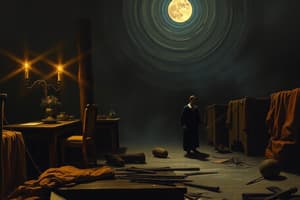Podcast
Questions and Answers
Find and write a line from this chapter that supports the claim that Wiesel and his father were treated more like animals than humans.
Find and write a line from this chapter that supports the claim that Wiesel and his father were treated more like animals than humans.
'You..you...you...' They pointed their fingers, the way one might choose cattle, or merchandise.
What detail shows the reader that the dentist from Czechoslovakia likely was not actually a dentist?
What detail shows the reader that the dentist from Czechoslovakia likely was not actually a dentist?
The man's teeth are described as 'yellow and rotten.' His manner doesn't instill any confidence.
Why does Wiesel finally relent and agree to give the gold crown to Franek?
Why does Wiesel finally relent and agree to give the gold crown to Franek?
It's a move to protect his father, who is unable to march in time and, therefore, earns frequent beatings from Franek.
To what is Wiesel referring when he says, 'That was what life in a concentration camp had made of me'?
To what is Wiesel referring when he says, 'That was what life in a concentration camp had made of me'?
Identify the literary device Wiesel uses in this line: 'At first, my father simply doubled over under the blows, but then he seemed to break in two like an old tree struck by lightning.' What does the comparison emphasize?
Identify the literary device Wiesel uses in this line: 'At first, my father simply doubled over under the blows, but then he seemed to break in two like an old tree struck by lightning.' What does the comparison emphasize?
What does Juliek say that shows the callousness that life in the concentration camp is creating?
What does Juliek say that shows the callousness that life in the concentration camp is creating?
Give two pieces of evidence that argue this is the moment where Wiesel's faith in God is broken.
Give two pieces of evidence that argue this is the moment where Wiesel's faith in God is broken.
Flashcards are hidden until you start studying
Study Notes
Treatment Comparison
- Wiesel and his father experience dehumanization, illustrated by the comparison to animals: "They pointed their fingers, the way one might choose cattle, or merchandise."
Questioning Credentials
- The dentist's dubious profession is suggested by his "yellow and rotten" teeth and a lack of confidence-inspiring demeanor.
Sacrifice for Family
- Wiesel relinquishes his gold crown to Franek to protect his father from beatings, showing a prioritization of familial bonds over personal assets. This temporary relief is short-lived due to Franek's transfer.
Internal Conflict
- Wiesel depicts a moment of shame when he expresses anger toward his father for attracting Idek's wrath, revealing how survival instincts can overshadow familial love and empathy.
Simile Emphasis
- The simile comparing Idek's power to lightning conveys the uncontrollable and devastating force of the guards, reflecting the chaotic and violent environment of the camp.
Emotional Desensitization
- Juliek’s remark during a public hanging—"This ceremony, will it be over soon? I'm hungry..."—highlights the normalization of brutality in the concentration camp, shocking the reader with its casualness.
Crisis of Faith
- The hanged boy, described as having "the face of an angel," symbolizes innocence and highlights the profound loss of faith for Wiesel.
- Wiesel's declaration that "God is hanging in the gallows" signifies a spiritual crisis, suggesting God’s absence in the face of evil.
- The symbolism of the setting sun at the moment of the hangings represents the diminishing hope and presence of divinity, aligning with the book's title and themes.
Studying That Suits You
Use AI to generate personalized quizzes and flashcards to suit your learning preferences.




